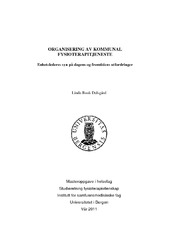Organisering av kommunal fysioterapitjeneste. Enhetslederes syn på dagens og fremtidens utfordringer
Master thesis
Permanent lenke
https://hdl.handle.net/1956/7557Utgivelsesdato
2011-05-14Metadata
Vis full innførselSamlinger
Sammendrag
Over the last decades, the role of the municipality in the Norwegian health service has experienced continuous changes. Since the 1980’s the changes have closely correlated to the international trend “New Public Management”. The goal has been to increase efficiency and quality in the public sector by introducing models from the private industry and commerce. Both the Municipal health service act (1984) and the Local government act (1992) have influenced the development of the municipality. At present, a new health sector reform, the Coordination reform, is about to be implemented. This reform aims to give the individual necessary treatment locally. Consequently the municipalities will need to adapt to the changes. The aim of this study is to investigate the challenges who is present in the organisation of municipal physiotherapy services. Further, it aims at identifying potential challenges following the Coordination reform. The research data consist of two focus group interviews with the heads of occupational- and physiotherapy services in the municipality of Bergen. The interviews where conducted 4 weeks apart. All the participants where women, aged 45-65, with profound experience as leaders and physiotherapists. When processing the data I applied Malterud`s (2006) method of meaning condensation of transcribed interviews. In todays organisation of the physiotherapy services, some challenges stood out: Limited economic external conditions, physiotherapists` different contracts with the municipality, and the varying worktasks of the physiotherapy services. To meet the intentions of the Coordination reform one can expect that physiotherapists will receive new and altered work arenas. This could potentially increase the need for physiotherapists and consequently increase founding. Therefore it can be argued that the challenges presented may open up for new possibilities for the physiotherapy profession. Kommunenes rolle i det norske helsevesenet har de siste tiår gjennomgått kontinuerlige endringer. Fra 1980 tallet av har endringene i stor grad samsvart med den internasjonale trenden ”New Public Management”, og målet har vært å øke effektiviteten og kvaliteten i offentlig sektor ved innføring av modeller fra privat næringsliv. Både kommunehelsetjenesteloven (1984) og kommuneloven (1992) har påvirket kommunenes utvikling. Nå står en ny helsereform, samhandlingsreformen, for tur. Denne reformen tar sikte av seg til å gi den enkelte behandling lokalt, og vil ilegge kommunene mer ansvar for innbyggernes helse. Dette er med på å gi kommunene nye utfordringer, og det synes naturlig at kommunene vil gjennomgå endringer for å tilpasse seg disse. Hensikten med denne studien er å se nærmere på de utfordringer som er tilstede i organiseringen av kommunal fysioterapitjeneste, samt å si noe om hvilke utfordringer tjenesten kan forvente som følge av samhandlingsreformen. Forskningsmaterialet består av to fokusgruppeintervjuer med enhetslederne for ergo- og fysioterapitjenesten i Bergen kommune. Intervjuene ble holdt med ca en måneds mellomrom. Deltakerne var alle kvinner, i alderen 45 til 62 år, og med solid erfaring som ledere og fysioterapeuter. I bearbeidelsen av materialet tok jeg utgangspunkt i Malterud (2006) sin metode for meningskondensering av intervjutekster. Begrensede økonomiske rammebetingelser, at fysioterapeuter har ulike avtaletilknytninger til kommunen, samt fysioterapeuters varierte arbeidsdag pekte seg ut som utfordringer i dagens organisering av fysioterapitjenesten. For å imøtekomme intensjonene i samhandlingsreformen forventes det at fysioterapeuter i fremtiden vil kunne få nye og endrede jobbarenaer. Dette kan gi behov for flere fysioterapeuter og økte bevilgninger til fysioterapitjenesten. Det vil således kunne argumenteres for at de utfordringer som er presentert kan romme muligheter for fysioterapeuter som yrkesgruppe.
